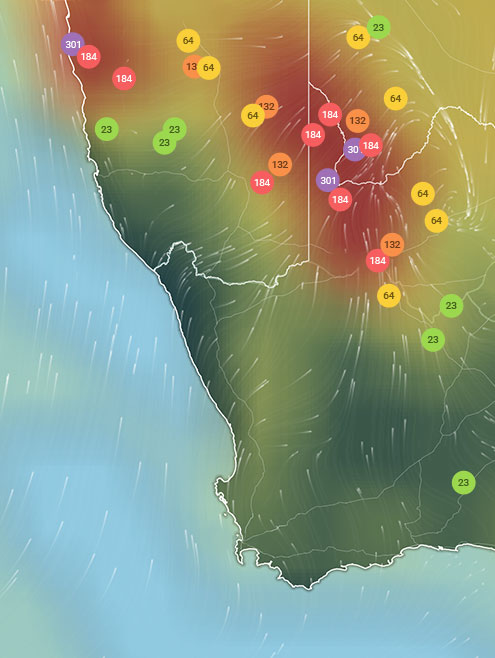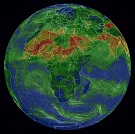Get a monitor and contributor to air quality data in your city.
201 people follow this city






AIR QUALITY DATA CONTRIBUTORS
Find out more about contributors and data sources| Weather | Broken clouds |
| Temperature | 59°F |
| Humidity | 39% |
| Wind | 1.3 mp/h |
| Pressure | 30 Hg |
| # | city | US AQI |
|---|---|---|
| 1 | Coronel, Biobio | 60 |
| 2 | Huasco, Atacama | 59 |
| 3 | Coquimbo, Coquimbo | 55 |
| 4 | Talcahuano, Biobio | 55 |
| 5 | Santiago, Santiago Metropolitan | 51 |
| 6 | Puchuncavi, Valparaiso | 49 |
| 7 | Calama, Antofagasta | 45 |
| 8 | Concon, Valparaiso | 45 |
| 9 | Temuco, Araucania | 42 |
| 10 | Quintero, Valparaiso | 37 |
(local time)
SEE WORLD AQI RANKING
| # | station | US AQI |
|---|---|---|
| 1 | Rancagua I | 56 |
| 2 | Rancagua II | 52 |
(local time)
SEE WORLD AQI RANKINGUS AQI
54
live AQI index
Moderate
| Air pollution level | Air quality index | Main pollutant |
|---|---|---|
| Moderate | 54 US AQI | PM10 |
| Pollutants | Concentration | |
|---|---|---|
| PM2.5 | 11µg/m³ | |
| PM10 | 61µg/m³ | |
| SO2 | 0.8µg/m³ | |
PM2.5
x2.2
PM2.5 concentration in Rancagua is currently 2.2 times the WHO annual air quality guideline value
| Sensitive groups should reduce outdoor exercise | |
| Close your windows to avoid dirty outdoor air GET A MONITOR | |
| Sensitive groups should wear a mask outdoors GET A MASK | |
| Sensitive groups should run an air purifier GET AN AIR PURIFIER |
| Day | Pollution level | Weather | Temperature | Wind |
|---|---|---|---|---|
| Monday, Apr 22 | Good 42 AQI US | 71.6° 48.2° | ||
| Tuesday, Apr 23 | Moderate 65 AQI US | 71.6° 50° | ||
| Wednesday, Apr 24 | Moderate 61 AQI US | 69.8° 48.2° | ||
| Wednesday, Apr 24 | Good 25 AQI US | 69.8° 48.2° | ||
| Today | Moderate 54 AQI US | 66.2° 46.4° | ||
| Friday, Apr 26 | Good 22 AQI US | 66.2° 42.8° | ||
| Saturday, Apr 27 | Good 33 AQI US | 66.2° 44.6° | ||
| Sunday, Apr 28 | Good 25 AQI US | 62.6° 50° | ||
| Monday, Apr 29 | Good 13 AQI US | 50° 48.2° | ||
| Tuesday, Apr 30 | Good 29 AQI US | 53.6° 44.6° | ||
| Wednesday, May 1 | Good 26 AQI US | 59° 41° |
Interested in hourly forecast? Get the app
Rancagua is a city in central Chile and part of the Rancagua conurbation. It is the capital of the Cachapoal Province and of the O'Higgins Region, located 87 kilometres south of the capital of Santiago. After a census which was conducted in 2012, it was estimated that Rancagua had a population of approximately 232,000 inhabitants.
Towards the middle of 2021, Rancagua was experiencing a period of air quality which was in the category as being “Unhealthy for sensitive groups” with a US AQI number of 113. This United States Air Quality Index number is an internationally used set of metrics supported by the World Health Organisation (WHO) and is used to compare the air quality in different cities throughout the world using comparable standards. It is calculated by using the levels of the six most commonly found pollutants. If figures are not all available for all six, the figure is calculated using what data is available. In the case of Rancagua, the only pollutants measured were PM2.5 and PM10 with respective figures of 36.5 µg/m³ and 46.5 µg/m³. It can readily be seen that the PM2.5 level is over three and a half times higher than the recommended figure of 10 µg/m³ as suggested by the World Health Organisation (WHO).
With a level such as this, the advice is to close doors and windows to prevent more dirty air from entering the room. Those of a sensitive disposition are advised to remain indoors or if travel outside is unavoidable, then a good quality mask is recommended. All forms of outdoor exercise should be postponed until the air quality improves. The table at the top of this page will help with that decision.
Air pollution can be very volatile and, as such, can change very quickly depending on many variables, such as wind speed and direction and the strength of sunlight.
Looking back at the figures published by the Swiss air monitoring company IQAir.com for 2020 it can be seen that the best air quality was found in December when the level was classified as being “Good” with a figure of 10.9 µg/m³. During May, June and July, the quality was at the worst when it was classified as being “Unhealthy for sensitive groups” with figures between 35.5 and 55.4 µg/m³. This leaves the months of January until the end of April and August until the end of November when the air quality was “Moderate” with readings between 12.1 and 35.4 µg/m³.
Records about air quality were first kept in 2017 when the average annual figure was 23.3 µg/m³ followed by 22.9 µg/m³ the following year. A decline was recorded in 2019 with a mean figure of 26.9 µg/m³ before another improvement in 2020 of 23.8 µg/m³. However, this may not be accurate because of the restrictions imposed due to the COVID-19 pandemic. Many vehicles were no longer used as the drivers were furloughed and not required to commute to and from work. There were also many factories and other non-essential production units which were temporarily closed in an attempt to prevent the spread of the virus.
In the particular case of Rancagua, the pollution produced by the mineral extraction works can also influence the environment. The landscape in Chile has been changing for a long time and several cities in the south, especially with more than 100,000 inhabitants, are polluted, especially by the use of wet firewood as heating.
As reported to "El Mercurio" by the O'Higgins Department of the Environment, the main sources of pollution in Rancagua are "residential firewood burning, which represents 64 per cent, and agricultural burning with 27 per cent".
Implement pollution plans that have 3 fundamental pillars: Thermal insulation of housing, 200 thousand subsidies to make over the next 10 years plus 200 thousand replacement heaters in the most polluted areas are planned. The decontamination plans aim to subsidise one out of every 3 existing heaters in polluted cities, those people with lower incomes will benefit, seniors and people with disabilities in homes and in terms of subsidy costs almost the entire subsidy for the heater is around a million pesos, and that being more efficient the heater allows most of the beneficiaries to feel that they are not paying more but that they are paying the same as before for heating.
The burning of stubble, and of any type of living or dead vegetation, is prohibited on agricultural, livestock or forestry land in the communes of the Cachapoal and Colchagua provinces, between April 1 and September 15. However, the SAG may authorise burning at any time of the year for reasons of sanitary security in the region. Burning tyres or other polluting elements is prohibited as is the free burning of dry leaves and all types of waste on public roads or in private areas.
The harmful effects of being exposed to air pollution include a long list. Among the most named diseases are those associated with the lungs, cardiovascular problems, skin alteration and poisoning. They highlighted that only 5 per cent of the world's population breathes clean air, while the other large percentage, 95 per cent, is exposed to air pollution.
Air pollution has a huge personal impact around the world, making it difficult for people with respiratory illnesses to breathe, sending young and old to the hospital, missing school and work, and contributing to premature death.
The atmospheric pollutants that are hazardous to human health are inhalable particulate matter (PM10, PM2.5 and gaseous chemical compounds such as nitrogen dioxide, ozone, sulphur dioxide, and carbon monoxide.
Indoor air contains a variety of harmful compounds derived from multiple sources. The most important are cigarette smoke, heating and cooking appliances, and biological agents and their by-products. Exposure to air pollutants can not only increase the morbidity rate but also the mortality rate, as well as increase the number of hospital admissions of patients with respiratory and cardiovascular symptoms. Air pollution is important in determining the quality of life of young children, the elderly and in patients with respiratory and cardiovascular diseases.
1Contributor
Government Contributor

2 stations
1 Data source